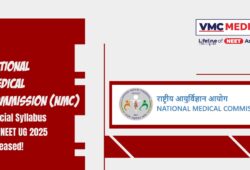How to Quickly Complete the NCERT Syllabus for NEET?
 Posted On
Posted On
212 total views, 1 views today
Preparing for the National Eligibility and Entrance Test (NEET) is a demanding task that requires extensive study hours and unwavering dedication. Central to NEET preparation is a thorough understanding of the NCERT (National Council of Educational Research and Training) textbooks. These books are praised for their comprehensive coverage of the NEET syllabus. However, effective time management remains a challenge for many aspirants. To help you cover the NCERT books swiftly and effectively, here are some key strategies and tips.
Prioritize the NCERT Syllabus
The NCERT textbooks are the cornerstone of your NEET preparation. Here’s how to prioritize them:
- Begin with the Basics: Start with the NCERT textbooks for Physics, Chemistry, and Biology. These are essential and recommended by experts.
- Detailed Reading: Go through each chapter thoroughly to understand the concepts and solve practice questions.
- Annotate Your Books: Use notes, highlights, and sticky notes to mark important points in your NCERT books.
- Strategic Reading: Read the summary and introduction of all chapters to frame your study plan effectively.
Set Achievable Goals
Setting clear, attainable goals helps in maintaining motivation and tracking your progress:
- Daily and Weekly Targets: Break down your study goals into daily or weekly targets. For instance, aim to complete one chapter of Biology in a week.
- SMART Goals: Ensure your goals are Specific, Measurable, Achievable, Relevant, and Time-bound (SMART), as this approach facilitates tracking your progress.
- Be Realistic: Don’t overburden yourself with too much material. Set achievable goals, such as covering the Chemical Thermodynamics unit in one day.
Utilize Supplementary Materials
While NCERT books are primary, supplementary materials can provide additional clarity on challenging topics:
- Online Resources: Use online educational platforms, video lectures, and study guides to enhance your understanding.
- Educational Channels: Seek out reputable educational YouTube channels and NEET-preparation websites for high-quality supplementary content.
Practice with Online MCQs
Multiple-choice questions (MCQs) are a crucial component of NEET. Efficient practice is essential:
- Chapter-wise MCQs: After completing a chapter, solve related MCQs. Many websites offer NEET-specific question banks.
- Analyze Your Mistakes: Review the MCQs you got wrong to identify areas that need more attention.
Take Regular Mock Tests
Simulating exam conditions is vital for effective preparation:
- Full-length Mock Tests: Regularly take full-length NEET mock tests to get familiar with the exam pattern and improve time management.
- Performance Analysis: Analyze your performance in mock tests to identify strengths and areas for improvement.
- Simulate Exam Conditions: Take mock tests under exam-like conditions, including adhering to time limits to build endurance.
Join Study Groups
Study groups can be extremely beneficial when used effectively:
- Collaborative Learning: Form or join a study group with peers preparing for NEET. Let’s delve into intricate ideas and exchange knowledge with one another.
- Reinforce Learning: Explaining topics to your study group members can reinforce your understanding.
- Stay Focused: Ensure the group remains focused on study goals and doesn’t turn into a social gathering.
Review Past Papers
Previous years’ question papers offer valuable insights:
- Understand the Pattern: Review and solve past NEET question papers to understand the exam pattern and frequently asked topics.
- Identify Trends: Identify recurring themes and prioritize these topics in your preparation.
General Tips for Efficient Preparation
Here are some general tips to help you cover the NCERT syllabus for NEET more effectively:
Effective Time Management
Managing your time efficiently ensures you cover all topics without rushing:
- Structured Schedule: Create a daily and weekly study schedule, allocating specific time slots for each subject and topic.
- Include Breaks: Incorporate buffer times for breaks, relaxation, and revision.
- Consistency: Stick to your plan as much as possible to build a consistent study routine.
Active Reading Techniques
Actively interacting with the material improves understanding and recall:
- Interactive Reading: Engage with the content by asking questions, underlining key concepts, and summarizing sections in your own words.
- Note-taking: Take detailed notes in a separate notebook while studying. Explain difficult subjects in a way that makes sense to you.
Regular Revision
Effective revision is crucial for retention:
- Summary Sheets: Create summary sheets or flashcards with key points, formulas, and concepts from each chapter.
- Dedicated Revision Time: Allocate specific times in your schedule for revision before taking mock tests.
- Revisit Notes: Go over your NCERT notes and annotations during revision sessions.
Seek Guidance When Needed
Never be afraid to ask for assistance when you run into problems:
- Ask for Help: Reach out to teachers, mentors, or online forums if you need help understanding a particular topic.
- Address Doubts Promptly: Don’t let doubts accumulate; address them promptly for a clear understanding.
Maintain a Healthy Lifestyle
Effective learning is supported by a healthy body and mind:
- Balanced Diet: Prioritize a balanced diet, regular exercise, and adequate sleep to boost cognitive functions.
- Stress Management: Manage stress with relaxation techniques like meditation, deep breathing, or yoga.
Stay Positive and Motivated
A positive attitude can significantly impact your study approach:
- Growth Mindset: Maintain a growth mindset and believe in your ability to improve.
- Motivation: Stay motivated by setting small rewards for achieving your study goals.
Eliminate Distractions
A focused study environment is essential:
- Dedicated Study Space: Create a distraction-free study space. Avoid your phone, social media, or noisy surroundings.
- Productivity Tools: Use productivity apps or website blockers to stay on track during study hours.
Closing Thoughts
Remember, efficient preparation is about quality over quantity. Focus on understanding and retaining information rather than rushing through the material. Tailor your study strategy to your learning style and adapt as needed to effectively cover the NCERT syllabus for NEET. With the right approach, you can maximize your study time and be well-prepared for the exam.




